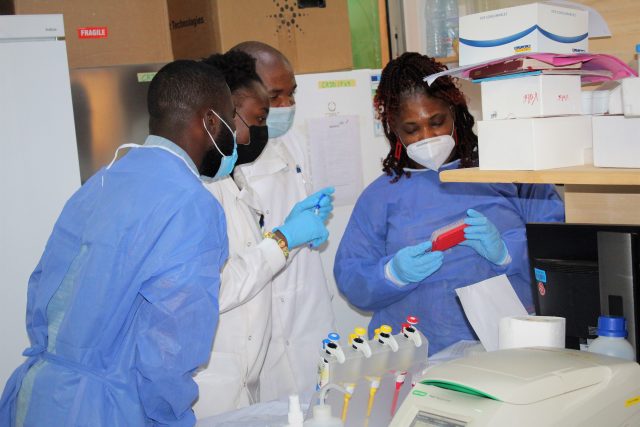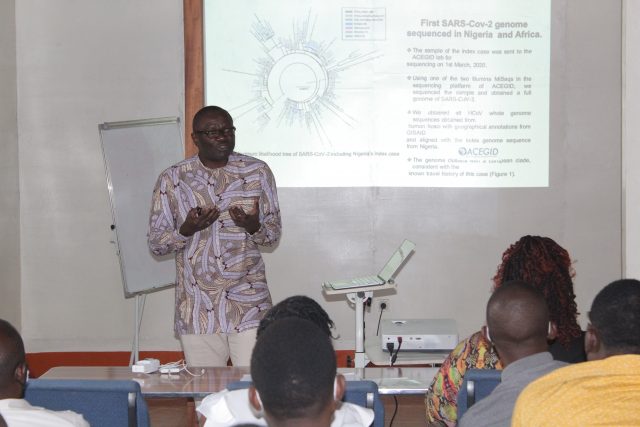In February 2022, Prof Christian Happi, Director of The African Centre of Excellence for Genomics of Infectious Diseases (ACEGID), and his team were at CRID for a two weeks training session.
From February 18 to March 2, 2022, CRID researchers benefited from a fourteen days capacity-building training with the ACEGID team from the Redeemer’s University at Ede, Nigeria. The workshop was held at CRID, in Yaounde, Cameroon’s political Capital. During the training, CRID staff were trained on how to set up the Illumina Miseq & Nanopore MinION sequencing platforms to sequence SARS-CoV-2 & arboviruses. Prior to the training proper, Prof Christian Happi gave a talk on Next-Generation Sequencing (NGS) and its opportunities. With the ongoing COVID-19 pandemic, Next Generation Sequencing (NGS) has become an indispensable tool in genetics and genomics.

Practical session on next genration sequencing
13 days intensive practical session
The training was designed to include theoretical and practical sessions on next-generation sequencing technologies currently available at CRID such as the illumina Miseq short-read and Oxford Nanopore MinION long-read sequencing platforms. Laboratory technicians and post-doctoral scientists were trained on how to operate these machines.These thirteen days of intensive training was focused on getting a deeper understanding of high throughput sequencing and also to enable CRID to perform sequencing on site. This training included presentations, discussions and hands-on sessions covering library preparations, sequencing and data analysis. The practical session involved sequencing previously collected COVID-19 samples using the COVIDseq illumina kit on the Miseq and the ONT midnight SARS-COV-2 protocol on the MinION. Some specific aspects addressed included; making high-quality libraries from samples, preparing flow cells for sequencing and performing sequencing runs on the various platforms, and determining if a run has performed well. Open-source tools such as IDseq, pangolin COVID-19, EDGE bioinformatics and Nextclade were introduced and used to analyze the data. 16s metagenomic analysis was also performed on mosquitoes to check for microbial diversity.

Prof Christian Happi giving a talk.
A successful workshop
The success of this training was reflected in the generation of 16s metagenomics data and some COVID genomes obtained with both sequencing platforms. At the end of the workshop, excellent feedback were obtained from both the trainers and trainees, demonstrating that, a strong collaboration has been established between these two research centres. CRID and ACEGID intends to continue working together with a strong desire to make a difference in the fight against infectious disease. This workshop goes in line with CRID’s mission which is to perform high-quality and internationally approved research on diseases in Cameroon and Africa and to contribute to capacity building by training the next generation of African scientists.






